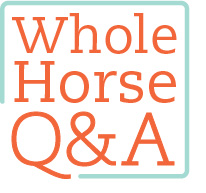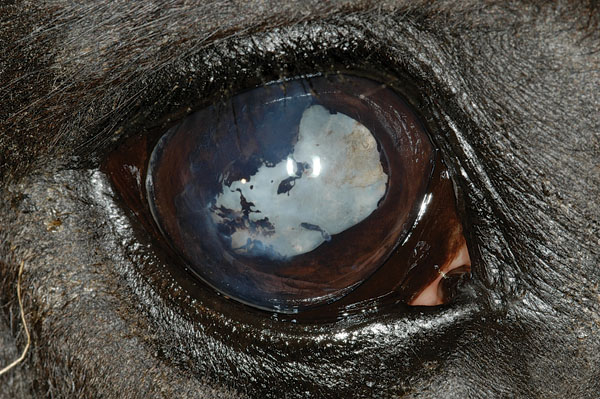Q: I’m leasing, with option to buy, a 7-year-old Appaloosa gelding. He’s a fantastic horse—can be ridden in shows and on the trail—and seems to be in good health. I’ve heard, however, that Appaloosas may be at risk for an eye condition that may lead to blindness. What is the condition, is it common in Appaloosas, and is there a way to know if this particular horse will be affected?

MARIE TROY, Massachusetts
A: The condition you’re asking about is equine recurrent uveitis, or ERU. It’s also known colloquially as moon blindness and periodic ophthalmia. ERU is an inflammatory condition of the interior of the eye, and although it’s not exclusively a disease of Appaloosas, it’s true that it’s more common in that breed than in others.
The signs an owner might notice aren’t very specific; they include squinting, tearing, and cloudiness to the eye. Given these symptoms, your veterinarian would need to do a thorough ocular examination to tell if the cause of the signs was indeed ERU.

As “recurrent” in the name implies, the disease tends to have a waxing and waning course. The cause of ERU is autoimmune attack of the ocular tissues, meaning the eye’s white blood cells (normally present to fight off bacterial, fungal, and viral infections) begin to fight the eye’s own tissue for reasons we don’t understand well. Though we know there’s a genetic predisposition to the disease, there’s currently no test available to pinpoint whether any given horse will acquire the disease or be free of it.
Your best bet is to arrange for a good pre-purchase exam, with particular attention paid to any clinical signs that one or both eyes has already been affected. Be aware, however, that although the first attack generally occurs at 4 to 8 years of age, your horse could have a perfectly normal eye exam now and still develop ERU in the future.
Once a horse acquires the disease, there are ways to treat it, but blindness can still occur due to resulting cataract formation or retinal damage.
DAN WARD, DVM, PhD, DACVO
Professor of Ophthalmology
University of Tennessee
College of Veterinary Medicine






